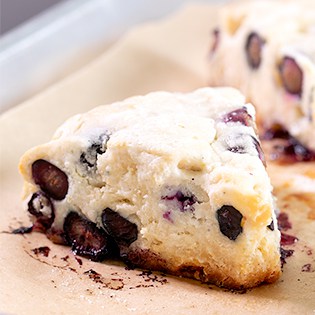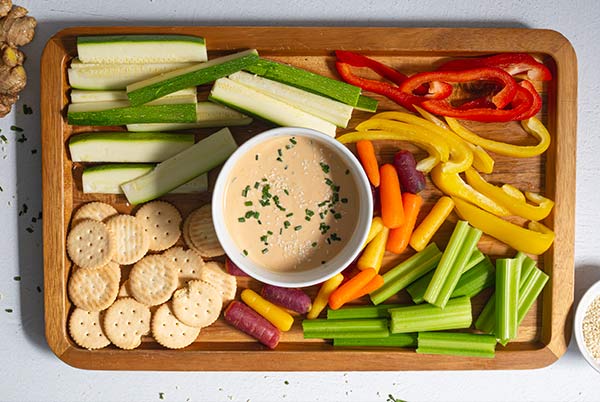Bake up gluten free blueberry scones when you want a sweet (but not too sweet) treat. These gf blueberry scones are light and flaky with a tangy flavor.
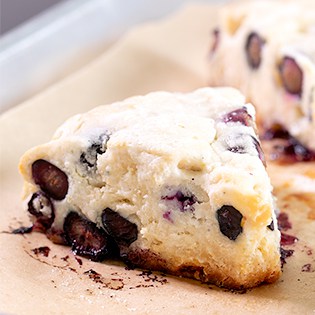
These gluten free blueberry scones are tender and flaky inside, with a lightly crisp top. And you can turn them vegan with just a couple of tweaks. But just as they are—bursting with fruit and luscious flaky, crumbly pastry—these are gluten free scones the whole family will love.
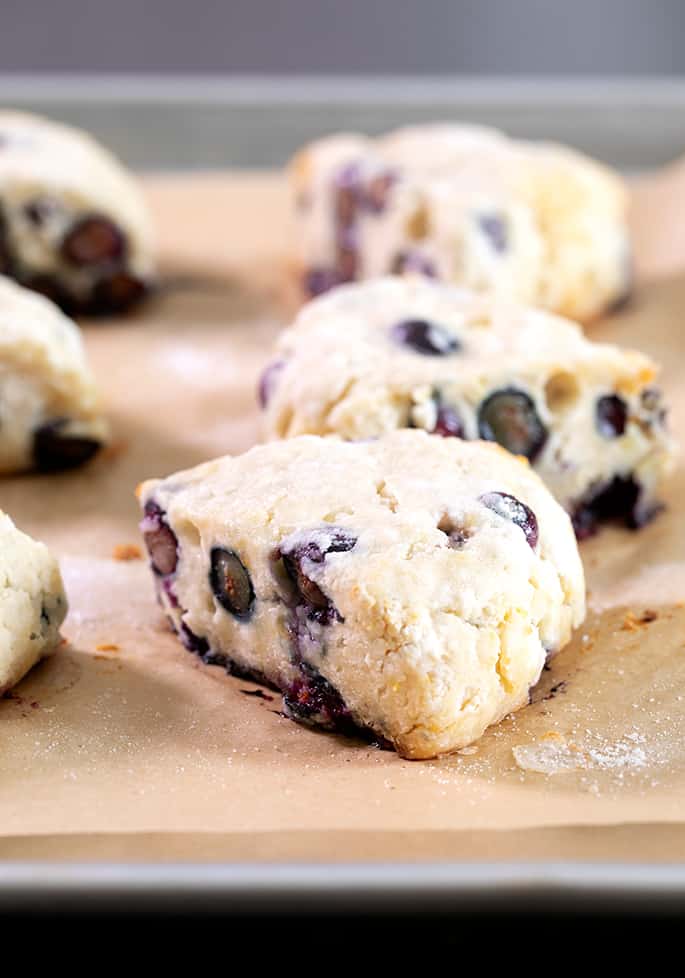
Biscuits and scones and cookies
As you likely know, I’m from the U.S. and live in New York. To me, biscuits aren’t that distinct from scones. If you’re in England or Australia (as many of you are; hi, friends!), when I say “biscuits” you aren’t entirely sure what I mean. That, or you just think I don’t know what, say, a chocolate chip cookie really is.
To clarify, to me, biscuits are small round pastries that are leavened with baking powder (Nigella explains it to our UK friends), baking soda (bicarbonate of soda to you, maybe?) or a combination. They’re typically quite flaky and puffy, thanks to the chemical leaveners but also to the chunks of cold fat that expand when they hit the heat of the oven.
Biscuits to you may very well be cookies. I adore cookies and have probably over 100 gluten free cookie recipes here on the blog. But to my ears, biscuits are not cookies.
Scones are very similar to biscuits in the U.S., but they tend to be a bit firmer and aren’t quite as layered and flaky as biscuits. They’re still a pastry, but they’re a bit drier than biscuits.
Why this is the best recipe for gluten free blueberry scones
The best scones are both buttery and moist, but pleasantly crumbly. The right recipe, like this one, has the perfect balance of cold, wet ingredients like butter and milk to keep that crumb tender, and enough flour to keep them from being squishy, like a muffin or other cake.
When you’re making not just “regular” gf scones, but blueberry scones, you’re introducing more moisture into the mixture. We want those blueberries to add texture and flavor without making our pastries weepy. This recipe does just that!
Gluten free blueberry scones ingredients
- All purpose gluten free flour – I like to stick with my old standby all purpose gluten free flour here, Better Batter (and of course you can always use my mock Better Batter). It makes these scones sturdy enough to be crisp-tender without ever falling apart before you break into one.
- Cornstarch – Added cornstarch helps lighten the scones and make them more tender. If you’re using a higher starch all purpose gluten free flour blend, like Cup4Cup, don’t add more cornstarch; instead, replace the cornstarch with more Cup4Cup.
- Baking powder and baking soda – These are the chemical leaveners that are responsible for most of the lift in these beautiful blueberry scones. Make sure yours are fresh by checking the date on the canisters.
- Salt – Salt brightens and enhances the other flavors in these mildly sweet scones. I always bake with kosher salt, or lightly flaked sea salt, since they’re easier to measure without mistakenly overmeasuring.
- Sugar – There’s just a touch of granulated sugar in these scones, but the sweetness comes mostly from the blueberries. Scones are special, in part, because their flavors are more delicate, and the added sweetener is no exception.
- Lemon zest and juice – Adding lemon zest and lemon juice doesn’t really make these into gluten free lemon blueberry scones; the added lemon is just enough to help brighten and complement the gentle sweetness and flavor of the blueberries.
- Butter – The butter in these scones is chopped and kept super cold and distributed evenly throughout the rest of the dough. That’s so that, when the scones hit the heat of the oven, the butter expands and creates the scones’ characteristic flakiness.
- Blueberries – You can use fresh or frozen blueberries here, but make sure they’re sweet! If you have a choice between fresh early-season blueberries that are kind of tough and sour or frozen berries, use frozen.
- Milk – Like the butter, your milk must be kept cold. Otherwise, it will melt the butter and keep the scones from becoming flaky. Avoid nonfat milk, which robs the scones of richness.
- Honey – Just a touch of honey in these scones adds a bit more sweetness and a subtle depth of flavor to the finished pastries.
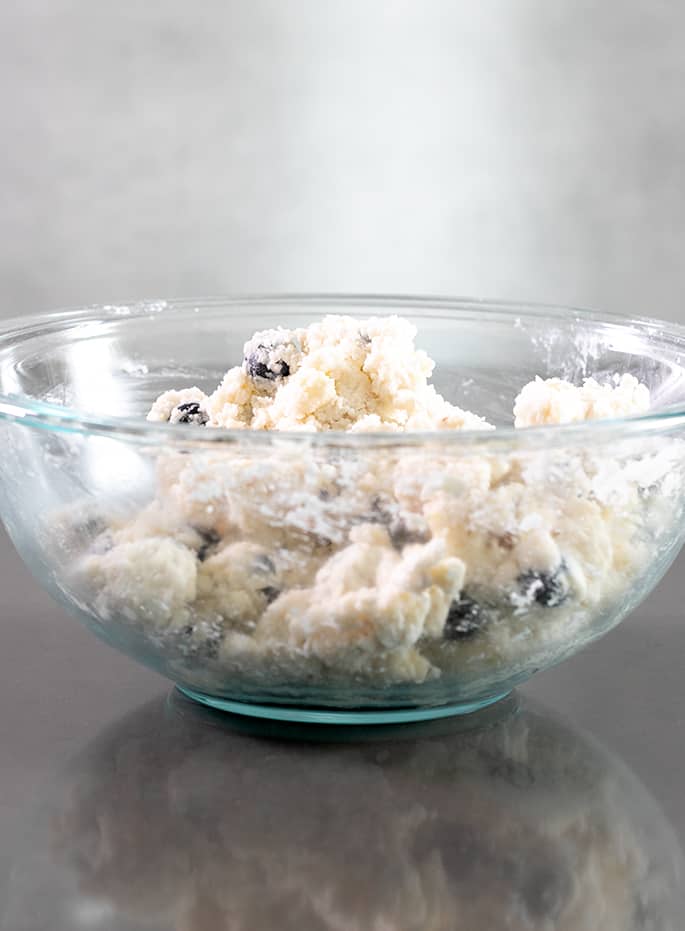
How to make gluten free scones with blueberries
Now that we know what I even mean when I call a recipe “gluten free blueberry scones,” perhaps you’d like to know how to make them. This being a recipe blog and all.
These scones are easily made in one single mixing bowl. The prep time is just about 10 minutes of active time, with a short spell in the freezer for the dough before it’s sliced.
In a large bowl, you’ll mix the dry ingredients (gluten free flour, baking powder, baking soda, salt, plus a small bit of granulated sugar), then add chunks of cold butter (see below for how to make this dairy-free) and flatten them in the dry ingredients. Flattening the butter once it’s in the dry ingredients keeps it from melting too quickly in your hands, or in the oven.
I also like to add lemon zest to the dry ingredients. Lemon flavor goes so beautifully with blueberries and brightens the whole recipe. Next, you’ll toss in the fresh blueberries and stir gently so you don’t break the berries. Medium-sized berries work best, as they hold their shape but don’t overwhelm any individual scone.
Finally, the wet ingredients (milk, lemon juice and honey) are added into a small well you’ll create in the dry ingredients. Be sure to mix gently and don’t handle the dough too much. You want the ingredients to stay cold, so the butter melts suddenly in the oven and not a moment before.
All that’s left to do is shape the dough into a disk, cut it into 6 triangles, brush the tops with milk and cover with a bit more sugar. The milk and sugar topping helps the tops of the scones brown a bit more in the oven without overbaking the rest of the scones.
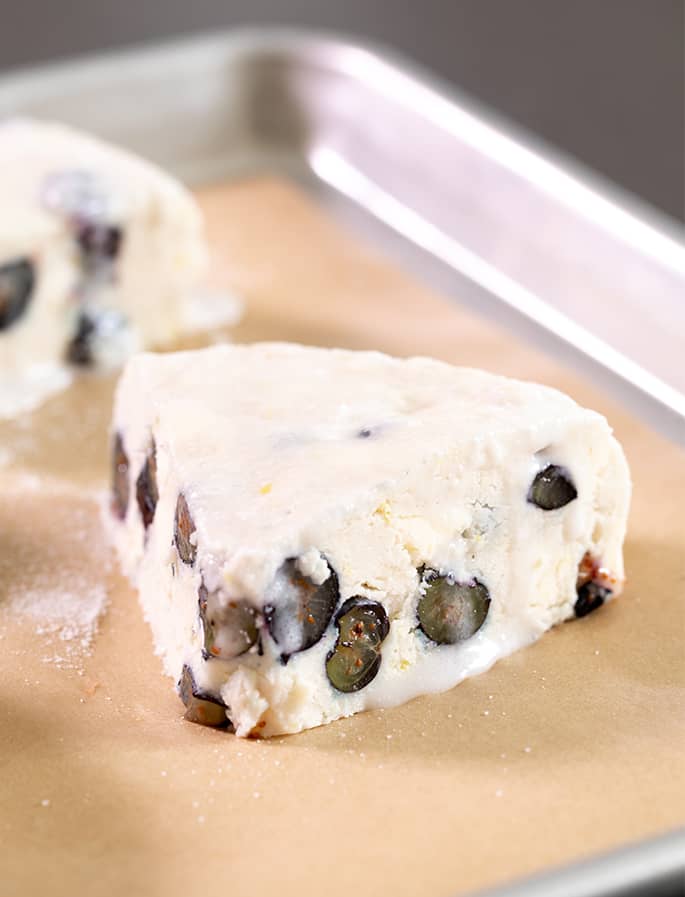
Tips for making the best gluten free scones
You shouldn’t have any trouble making these gluten free scones if you follow my simple recipe, but there are a few tips that can help guarantee your success.
Use chunks of very cold butter for the right texture
Many recipes recommend that you use a pastry cutter or other metal utensil to break the cold butter into “pea-sized pieces.” That often leads to tough pastries, though, since such small pieces of butter will often melt when you handle them at all.
Instead, I prefer to chop the fat into chunks, keep the butter extremely cold, toss the butter in the dry ingredients and then flatten it between my thumb and forefinger. That way, the pieces of butter don’t clump together, and remain evenly distributed throughout the dough so they are well-positioned to expand in the oven and create flakiness.
How to shape your gluten free blueberry scones
Shape your scones by using a light touch, pressing the dough together just until it holds, but without warming it up. If there are sticky parts, dust your hands lightly with more gf flour as you go.
Don’t skip the milk and sugar topping
The brush of milk with a dusting of sugar on top adds just a touch of sweetness and tons of amazing texture. It melts together in the oven to create a wafer-thin, crispy crust that you will just love!
Let your gf scones cool completely
When your scones first come out of the oven, they’ll be a bit fragile. Let them cool completel before you attempt to transfer or handle them, since they’ll firm up and become really stable once cool.
Use parchment paper
Scones have a habit of sticking to a bare baking sheet. Using a parchment lined baking sheet prevents sticking.
How to store gf blueberry scones so they stay fresh
With the perfect balance of moisture and crisp-tenderness, these gluten free blueberry scones actually last quite well for up to 3 days at room temperature. Just wrap them tightly, individually, and keep them at cool room temperature. You can even refresh them in the toaster over after sprinkling lightly with water first.
Freezing gluten free blueberry scones
For longer storage, you can freeze the scones, as baked. Just also wrap them quite tightly in a freezer-safe wrap like Glad Press n Seal, and then refresh in the toaster as described earlier.
If you’d like to make the raw dough ahead of time, shape it and prepare it right up the part where you are meant to brush the tops with milk and sprinkle with sugar. Store the shaped wedges in the freezer, wrapped tightly, then bake right from frozen after brushing with milk and sprinkling with sugar. Another few minutes in the oven may be necessary, but not much.
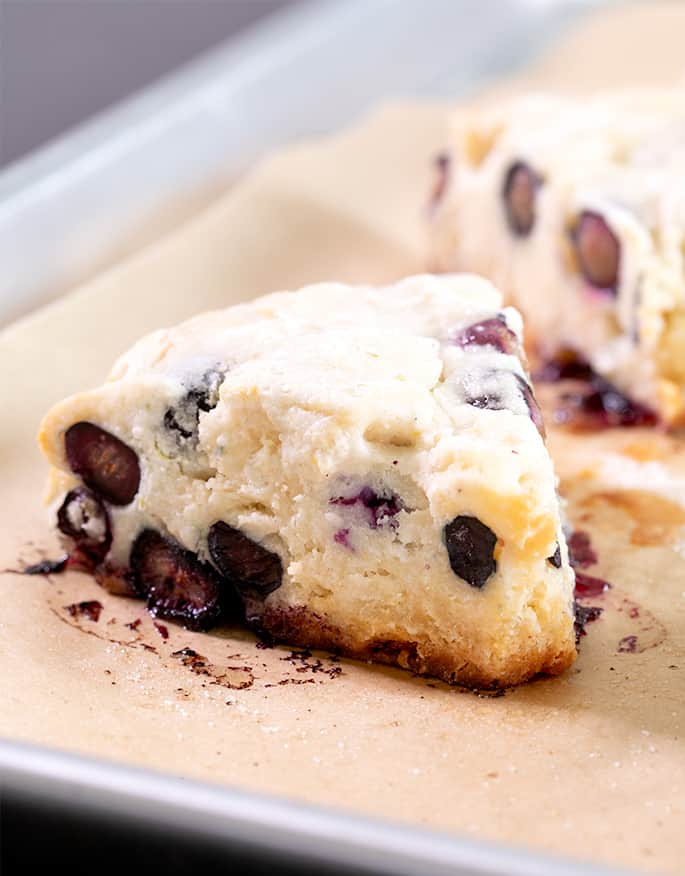
Gluten free blueberry scones: substitutions
As always, every recipe I create is a formula that works best when made exactly as written—down to the last gram of each ingredient! That’s how you’ll get results that are just like what you see here on the blog.
But I understand that conditions are never perfect and everyone should be able to bake along. Here is all the information I can provide on replacing any of the ingredients you see in the recipe with any others to help fit dietary needs that go beyond just gluten free.
Please keep in mind that, the more substitutions you make, the further away your results may be from mine. Baking is chemistry! Measuring by weight, not volume, using an oven thermometer to ensure your oven is at the right temperature, and taking care to use one of my recommended gluten free flour blends are all great ways to start off on the right foot.
Gluten free, dairy free blueberry scones
I have successfully made these gluten free scones dairy-free (and vegan) by replacing the butter with Miyoko’s brand cultured vegan butter (which my local Trader Joe’s now carries!) and with Melt brand vegan butter. I think it would also work with virgin coconut oil, but the scones won’t puff up quite as much.
For the milk, I used unsweetened coconut milk in the carton. Plain, unsweetened coconut milk in the carton is my favorite nondairy milk for cooking and baking. Its flavor is relatively neutral and it has enough fat to help baked goods brown.
In place of honey (to make the scones vegan), use Lyle’s Golden Syrup or light corn syrup. Either one will work just fine.
Gluten free, vegan blueberry scones
Follow the suggestions above to replace the dairy, and in place of honey, use Lyle’s Golden Syrup or light corn syrup. Either one will work just fine. Be sure that the granulated sugar you use is free of bone char.
Fresh or frozen blueberries?
Find yourself some really nice frozen blueberries, and you can use them in this recipe in place of fresh. But don’t defrost them!
Whatever precautions you take, the blue color will bleed into the batter. But if you defrost the berries, they’ll get crushed in the batter no matter how careful you are—and they’ll bleed even more.
I think this recipe would also work great using raspberries. If you’d like to make strawberry scones, that really requires a different recipe as strawberries have a ton more moisture. Try my recipe for strawberry shortcake biscuits, and shape them into scones instead of biscuits.
Cornstarch alternative
“Cornstarch” in the U.S. is also known as corn flour, and it’s just a finely milled starch. If you need to make this recipe corn-free, the cornstarch can easily be replaced with arrowroot.
Gluten free, sugar free blueberry scones
There is naturally occurring sugar in the berries that can’t be eliminated. But if you’d like to make this recipe free of added refined sugars, try replacing the honey with your favorite sugar-free liquid sweetener (something that actually has some bulk, unlike liquid Stevia) and the granulated sugar with Lankato brand monkfruit granulated sweetener.
Alternative sugars do tend to be drying, so you might need to add a touch more milk by the quarter-teaspoonful. Have a close look at the photos and the video to see what the raw gluten free scones dough should look like.
There really isn’t much sugar in this recipe at all, so replacing it shouldn’t be that difficult. But I haven’t tried making these sugar-free, so you’ll have to experiment!
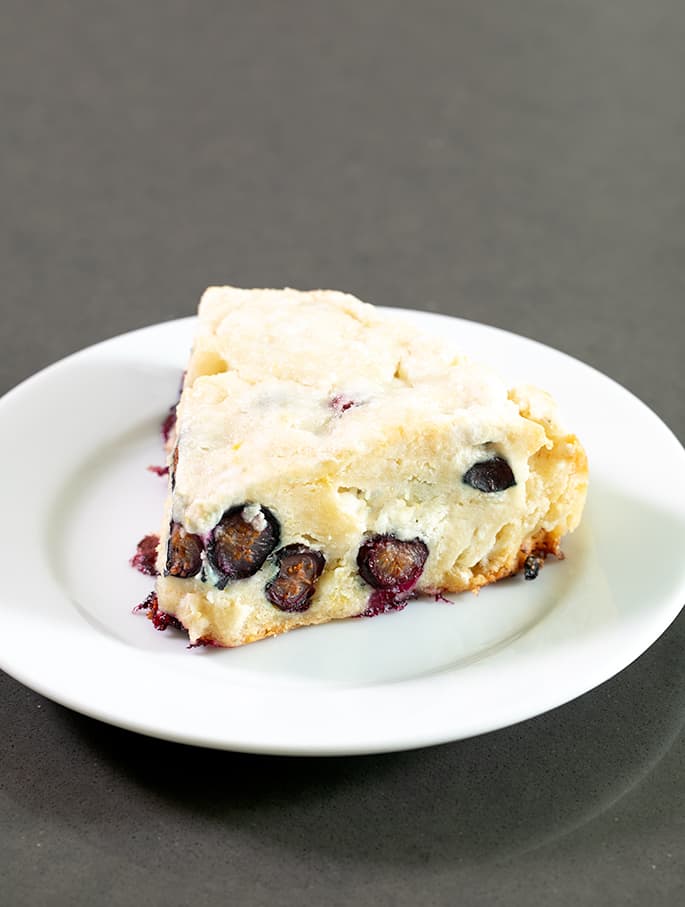
FAQs
Are scones gluten free?
No! Generally, scones are made with wheat flour, so they’re not gluten free. This recipe is made with gluten free flour, according to a gluten free recipe that has been properly balanced to turn out just like the “regular” ones, though!
Why didn’t my gluten free blueberry scones rise?
One of the most common reasons for gluten free blueberry scones (or any gluten free scones) not rising is that the baking powder isn’t fresh. Either it’s been open too long or it’s expired.
When do you eat gluten free blueberry scones?
I find these scones to a perfect and welcome snack, and will also stand in really well for gf blueberry muffins at breakfast or brunch.
What’s the best gluten free flour for blueberry scones?
The gluten free flour blend I like best here is a combination of Better Batter gluten free flour with an added helping of cornstarch to lighten it a bit. You could also use a full 2 cups (280 g) of Cup4Cup gf flour blend in place of both.
Why doesn’t this gluten free scone recipe call for buttermilk?
Because this recipe calls for lemon juice and zest, and since buttermilk can be a more difficult ingredient to keep on hand, this recipe was developed without calling for buttermilk. You only need regular milk, instead, for ease.
How do I get my gluten free blueberry scones to rise and be fluffy?
To get your scones to rise tall, here are a few tips to keep in mind:
- Measure your ingredients carefully, by weight, so your moisture balance is right
- Keep your ingredients cold, and shape using a light touch so the butter chunks stay intact and don’t begin to melt until the scones are in the oven
- Cut your scone wedges at a right angle to the surface they’re on using a bench scraper or sharp knife in a swift motion for a sharp edge
- Chill your shaped scones until they’re firm before putting them in a fully preheated oven, and no peeking!
- Use fresh baking soda and baking powder
Why did my gluten free blueberry scones come out dry?
Did you use a poorly-balanced all purpose gluten free flour blend, like one of King Arthur Flour’s blends? They will dry out your baked goods. Otherwise, be sure to measure by weight, not volume, whenever possible for precise, accurate measurements, and don’t make substitutions unless absolutely necessary.
Why aren’t my gf blueberry scones flaky?
For flaky scones, your dough must be cold, your butter must be in chunks (not in tiny pea-sized pieces), and your baking soda and baking powder must be fresh. Be sure not to handle the raw dough too much, or the warmth from your hands may melt the cold butter.
How do you keep gluten free scones fresh the next day?
Try storing your scones at room temperature out of direct sunlight after wrapping each tightly on its own. You can also store them in an airtight glass container at room temperature, but they tend to moisten one another that way.
Gluten Free Blueberry Scones
Bake up gluten free blueberry scones when you want a sweet (but not too sweet) treat. These gf blueberry scones are light and flaky with a tangy flavor.
Yield: 6 scones
Prevent your screen from going dark
Ingredients
- 1 ¾ cups (245 g) all purpose gluten free flour blend plus more for sprinkling (I used Better Batter; click thru for appropriate blends)
- 1 teaspoon xanthan gum (omit if your blend already contains it)
- ¼ cup (36 g) cornstarch
- 2 teaspoons baking powder
- ¼ teaspoon baking soda
- ½ teaspoon kosher salt
- 2 teaspoons (12 g) granulated sugar plus more for sprinkling
- Freshly grated lemon zest from 1 medium lemon
- 5 tablespoons (70 g) unsalted butter chopped into small chunks and chilled
- 1 cup (180 g) fresh blueberries
- ¾ cup (6 fluid ounces) milk plus more for brushing
- 1 tablespoon freshly squeezed lemon juice
- 2 tablespoons (42 g) honey
Instructions
-
Preheat your oven to 400°F. Line a rimmed baking sheet with unbleached parchment paper and set it aside.
-
In a large bowl, place the flour, xanthan gum, cornstarch, baking powder, baking soda, salt, granulated sugar, and lemon zest, and whisk to combine well.
-
Add the chopped and chilled butter, and toss to coat it in the dry ingredients. Flatten each chunk of butter between your thumb and forefinger.
-
Add the blueberries, and toss to coat.
-
Create a well in the center of the dry ingredients and add the milk, lemon juice, and honey. Mix gently until the dough begins to come together.
-
If necessary, press together into a dough with floured hands, handling the dough as little as possible.
-
Turn out the dough onto a large piece of plastic wrap and press into a disk that’s about 7 inches in diameter.
-
Wrap the disk tightly in the plastic wrap and place in the freezer to chill for about 10 minutes or until firm.
-
Remove the dough from the freezer, unwrap it, sprinkle the top with about 1 teaspoonful additional flour and spread out over the top of the disk.
-
Using a large, sharp knife or a bench scraper, cut the dough into 2 equal halves, then each of those halves into 3 equal triangles.
-
Place the wedges about 2 inches apart from one another on the prepared baking sheet, and using a pastry brush, paint the tops generously with milk. Sprinkle the tops generously with granulated sugar.
-
Place the baking sheet in the center of the preheated oven and bake until the scones are puffed, very pale golden all over and slightly more brown on the edges and top (about 20 minutes).
-
Remove from the oven and allow to cool for 10 minutes or until firm on the baking sheet before serving.
Notes
Originally published on the blog in 2018; additional text resources added in 2023.
Gluten Free Blueberry Scones
Bake up gluten free blueberry scones when you want a sweet (but not too sweet) treat. These gf blueberry scones are light and flaky with a tangy flavor.
Yield: 6 scones
Prevent your screen from going dark
Ingredients
- 1 ¾ cups (245 g) all purpose gluten free flour blend plus more for sprinkling (I used Better Batter; click thru for appropriate blends)
- 1 teaspoon xanthan gum (omit if your blend already contains it)
- ¼ cup (36 g) cornstarch
- 2 teaspoons baking powder
- ¼ teaspoon baking soda
- ½ teaspoon kosher salt
- 2 teaspoons (12 g) granulated sugar plus more for sprinkling
- Freshly grated lemon zest from 1 medium lemon
- 5 tablespoons (70 g) unsalted butter chopped into small chunks and chilled
- 1 cup (180 g) fresh blueberries
- ¾ cup (6 fluid ounces) milk plus more for brushing
- 1 tablespoon freshly squeezed lemon juice
- 2 tablespoons (42 g) honey
Instructions
-
Preheat your oven to 400°F. Line a rimmed baking sheet with unbleached parchment paper and set it aside.
-
In a large bowl, place the flour, xanthan gum, cornstarch, baking powder, baking soda, salt, granulated sugar, and lemon zest, and whisk to combine well.
-
Add the chopped and chilled butter, and toss to coat it in the dry ingredients. Flatten each chunk of butter between your thumb and forefinger.
-
Add the blueberries, and toss to coat.
-
Create a well in the center of the dry ingredients and add the milk, lemon juice, and honey. Mix gently until the dough begins to come together.
-
If necessary, press together into a dough with floured hands, handling the dough as little as possible.
-
Turn out the dough onto a large piece of plastic wrap and press into a disk that’s about 7 inches in diameter.
-
Wrap the disk tightly in the plastic wrap and place in the freezer to chill for about 10 minutes or until firm.
-
Remove the dough from the freezer, unwrap it, sprinkle the top with about 1 teaspoonful additional flour and spread out over the top of the disk.
-
Using a large, sharp knife or a bench scraper, cut the dough into 2 equal halves, then each of those halves into 3 equal triangles.
-
Place the wedges about 2 inches apart from one another on the prepared baking sheet, and using a pastry brush, paint the tops generously with milk. Sprinkle the tops generously with granulated sugar.
-
Place the baking sheet in the center of the preheated oven and bake until the scones are puffed, very pale golden all over and slightly more brown on the edges and top (about 20 minutes).
-
Remove from the oven and allow to cool for 10 minutes or until firm on the baking sheet before serving.
Notes
Originally published on the blog in 2018; additional text resources added in 2023.
